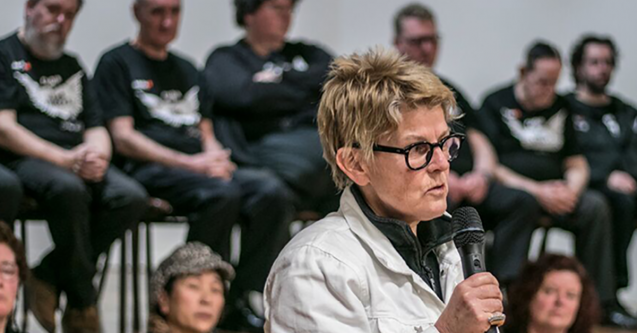Twenty years of honouring overdose victims
31 August 2020

Twenty years ago today, S.J. Finn created 6000 silver ribbons to launch the first International Overdose Awareness Day. Now a truly international movement held each year on 31 August, the commemorative day seeks to destigmatise and prevent death by accidental overdose.
It was a winter day in August 2000 when Finn, a family therapist, saw her vision for International Overdose Awareness Day (IOAD) come to life. A small group of guests joined her behind the building at The Salvation Army St Kilda Crisis Services, wearing silver ribbons to remember the people they’d lost to a drug overdose.
“When I started IOAD, I met clients who had lost sometimes up to 17 friends from an overdose and they really didn’t feel they had any right to mourn for these people because of the way in which they had died,” said Finn.
“I felt it was time to put a day aside on the calendar to mark the deaths of those we’d lost and those who had suffered permanent injury from an overdose – and also to raise awareness about how these deaths could be prevented.”
Finn’s motivation for founding IOAD was a lifetime in the making – over the course of her career as a family therapist and then manager at The Salvation Army St Kilda Needle and Syringe Program (NSP), she had seen hundreds of people impacted by drug overdoses.
Twenty years later, IOAD has grown to become a worldwide movement, reaching 39 countries across Asia, Africa, the Americas, Europe and the South Pacific.
Now run by the not-for-profit organisation, The Penington Institute, IOAD has resulted in the development of laws and an increase in services that assist in lowering deaths and harm related to overdoses across the world.
Breaking down stigma to save lives
Overdose doesn’t discriminate – it affects people from all economic and social backgrounds. At its heart International Overdose Awareness Day helps to remove the stigma of overdose, raises awareness of its far-reaching impact and provides people with the right to openly mourn someone they loved without judgement. On its 20th anniversary – and as the number of people lost to accidental death from a drug overdose grows due to the potency of the drugs in the community – this day is more important than ever.
The latest figures from The Penington Institute show that there were a total of 2162 drug-induced deaths in Australia in 2017 – a 43 per cent increase in 15 years (1231 in 2002).
“Every year, I pore over photos of people from all walks of life marching, remembering, teaching, learning and calling for a better world on International Overdose Awareness Day,” said CEO, John Ryan in The Penington Institute International Overdose Awareness Day Partners’ Report 2019.
“Penington Institute convenes International Overdose Awareness Day because it matters. It matters to those people who have lost loved ones. To those who are frightened of what drugs do to their families and communities. And to those who want to live in a safer, healthier world.”
As a harm-reduction practitioner at the St Kilda 24/7 Needle and Syringe Program (NSP), Finn still sees the consequences of this every day.
“This is about children who have lost parents, and parents who have lost children, and people who have lost partners and friends and siblings,” said Finn. “This is about an accidental death – someone who died suddenly and without any intention to do so. This is about lowering the stigma attached to these deaths, so the joy that someone brought their loved ones is remembered.”
Since its beginning, the epicentre of this initiative was at the St Kilda NSP, part of Crisis Services Network. The NSP and Access Health continue to implement strategies year-round to support people experiencing addiction and people who use drugs.
The staff have trained thousands of people to respond to opioid overdoses and provide opioid reversal medicine – naloxone – since 2013. Twenty per cent of the responders surveyed say this has been a ‘life-saving intervention’. And, over the past two years – since the NSP has been funded by The Department of Health and Human Services – they have completed over 2000 training sessions.
A lot has changed in 20 years – but there’s still work to be done. This International Overdose Awareness Day is a time to remember – and a time to act.
- National Alcohol and Other Drug Hotline 1800 250 015
- Direct Line 1800 888 236
- Family Drug Help 1300 660 068
This article first appeared in The Salvation Army’s online magazine Others.org.au